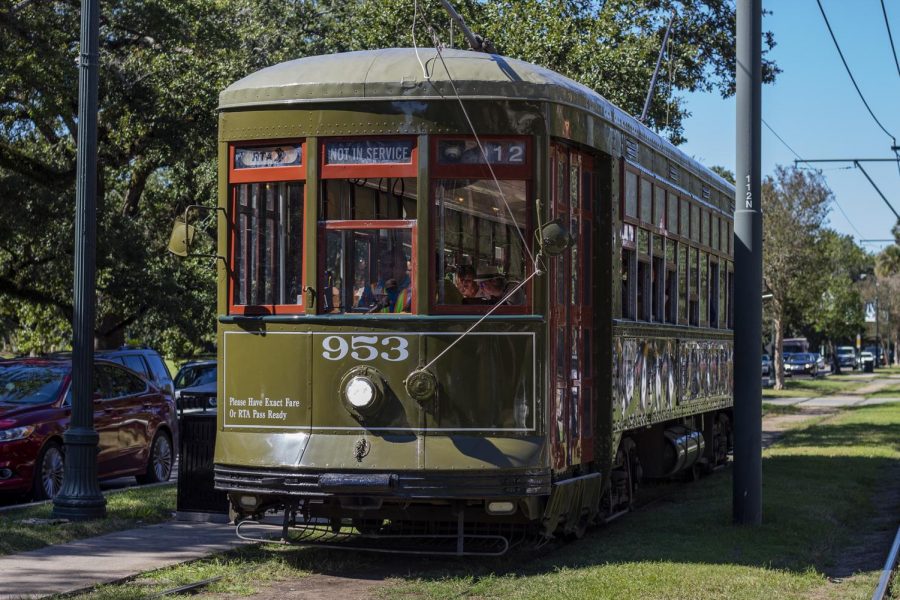Public transportation has a busload of issues
Streetcar headed toward S Carrollton Ave on October 23, 2019. This is one of the main forms of public transportation in New Orleans. Cristian Orellana/The Maroon.
October 26, 2019
As a commuter, I learned the hard way that public transportation in the United States has always been disconcertingly bad. I used to hate waking up really early during high school just to make it to class, and I did not want to endure the same thing in college. But in a city such as New Orleans, streetcar repairs, delayed buses and time-consuming transfer rides have made arriving to class on time a mission in itself.
My story is not an isolated case, as American public transit has become a subject of public disdain due to its poor state. According to a 2015 study in the Journal of American Planning Association, public transportation in the United States receives more hate on a daily basis than social welfare programs, the IRS, and even United Airlines. This has created a detrimental effect on our supposedly “superior” country, which is now being outshined by nations with better service. Back in 2016, the World Economic Forum rated the United States 16th in its assessment of the quality of its transport infrastructure, which is far below countries such as Japan, which has a highly efficient mass transit system, and France, which has a high-speed rail line that has broken world records for speed.
So why does the greatest country in the world have terrible public transit?
Public transportation is crumbling under the weight of misguided politics, as the federal government continues to slash funding for this particular infrastructure. President Donald Trump’s 2020 budget proposal includes a 22% cut in the U.S. Department of Transportation’s allocated budget for public transport. The American Public Transportation Association has countered that the national public transit system needs at least $232 billion for priorities such as repair and maintenance. In addition, the U.S. Department of Transportation has a backlog of over $2.4 billion in approved transit funds provided by Congress, according to Transportation for America. This has resulted in the Trump administration’s average time for project approvals through the Department of Transportation being double that of the Obama administration, citing recent analysis from the House Committee on Transportation and Infrastructure.
The right wing narrative that public transit is a socialist effort, and that roads are a better investment is ridiculous. Chicago Transit Authority President Dorval Carter has recently pointed out that bankrolling public transport instead gives out $4 for the national economy. Moreover, public transit generates about 21,000 jobs according to American Public Transportation Association, which is certainly good for the national economy. Therefore, investing in public transit makes good business sense. But building more public highways does not simply prevent traffic, and neglecting the withering public transport system with the idea that public transit projects are strictly in the state’s domain does not help matters.
A firsthand understanding of how and why public transit is important is essential in addressing its slow decline. In a recent Vox article, UC Berkeley professor of regional and city planning Robert Cervero suggests that politicians who even implicitly support investing public transportation “would like to see more public transit to decongest the roads and help the poor, but when it comes to trip-to-trip decision making, most people weigh the choices and just end up driving”. Therefore, walking the proverbial walk when it comes to the public transit issue is essential toward improving it.
On a local level, New Orleans has been dealing with its inability to get people from point A to point B on time for years. Now with Mayor LaToya Cantrell pledging for improvements in public transport, it won’t be long before mass transit in the city gets back on its feet. The New Orleans Regional Transit Authority just has to provide more buses to make sure that every commuter waiting in a particular route is accounted for. Stemming from this suggestion, the agency can also consider expanding its alternative bus routes in order to avoid traffic, which is the main reason for buses not arriving on time. After all, public transport is an essential link between people and their jobs, and especially commuter students like me who need to get ahead in school on time.








